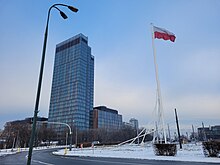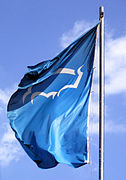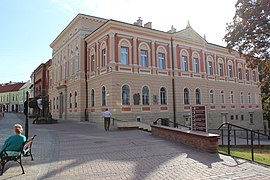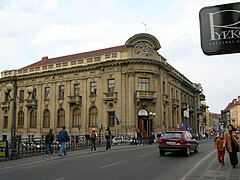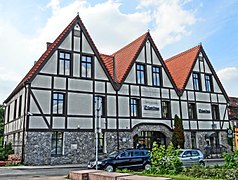|
Bank Pekao
Bank Polska Kasa Opieki Spółka Akcyjna, commonly using the shorter name Bank Pekao S.A., is a universal bank and currently the second largest bank in Poland with its headquarters in Warsaw. The Italian bank UniCredit used to own 59% of the company.[4] It sold the bank in December 2016.[5] Now Powszechny Zakład Ubezpieczeń owns 20% of the company, Polish Development Fund 12.80%, UniCredit 6.28% and others 60.94%. The bank was founded in 1929 by the Ministry of Treasury as a national bank, mainly to provide financial services to Poles living abroad.[4] In 1939 the bank had branches in virtually every capital city of countries where Poles lived. The full name "Polska Kasa Opieki" may be translated literally as "Polish Bank of Aid", and the popular form "Pekao" sounds out the acronym "PKO". HistoryFormative yearsIn 1929, the CEO of Pocztowa Kasa Oszczędności, Henryk Gruber, observed that there was a demand for a bank that could provide financial services to the eight million Poles living outside the country. Starting from these assumptions, on 17 March 1929,[6] the Ministry of Finance established Bank Polska Kasa Opieki Spółka Akcyjna.[7] On 29 October of the same year, the Warsaw District Court entered Bank Polska Kasa Opieki SA in the commercial register. The company's shareholders were Pocztowa Kasa Oszczędności, Bank Gospodarstwa Krajowego and Państwowy Bank Rolny. The first branches were opened in France, Argentina, and the United States, and in Tel Aviv (now Israel). By 1939 Pekao had branches in the capitals of most countries where Polish emigres had settled.[8] People's Republic of PolandAfter the end of World War II and the beginning of the Soviet domination in Poland, the bank took care of international financial operations conducted by the authorities of the newly established Polish People's Republic. With the bank's help, the Poles who live abroad could support their families behind the Iron Curtain. In 1968, the Minister of Finance authorized the establishment of foreign currency accounts for persons working abroad in Bank Pekao. Monopoly on their conduct Pekao lost only in 1989 with the onset of economic reforms that swept in Poland and the communist bloc.[9] In the 1970s, currency accounts in Pekao were divided into three categories: Account A for people paying currencies with documented origin,[10] B accounts for payments with undocumented origin, and C accounts for foreigners. The funds from B accounts could not be legally exported abroad, but in 1976 the rights of A and B accounts were leveled.[10] In 1974, the bank had around 91,000 registered accounts. At the end of the 1980s, the total value of foreign currency accounts was US$3.3 billion.[11] Much earlier, in 1960, the bank began issuing its own vouchers, "Bon Towarowy PeKaO", denominated in US dollars. Initially, for these vouchers (as well as directly for convertible currencies deposited in domestic and foreign bank representations) it was possible to buy both foreign and deficit domestic goods in the foreign sales network operated directly by Bank Pekao.[12] The offer of the bank for individual clients included a variety of goods covering, among others, groceries (including "Krakus" ham and western chewing gum), alcohol, cosmetics, textiles, household appliances, bicycles, motorcycles, cars, trucks, tractors, agricultural machinery, fuel, building materials, installation and sanitary equipment, and also apartments and furniture. This retail network was created with the establishment of the Pewex "internal export" company, in 1972 out of the bank's structures.[10] Third Polish Republic (1989–present)On 3 August 1999, Pekao became a member of the UniCredit company.[13] In December 2016, Polish state-owned PZU together with Polish Development Fund acquired Bank Pekao – Poland's second largest bank previously owned by Italian bank UniCredit by buying a 32.8% stake in the bank for the amount of PLN 10.6 billion (EUR 2.6 billion).[14] In September 2018 Bank Pekao has opened a representative office in London, with the aim to facilitate cooperation between Poland and the UK and to stay close to their clients and investors. Bank Pekao also plans on opening several other offices across Europe.[15] At the end of 2020, Bank Pekao announced its acquisition of Idea Bank, which was subjected to compulsory restructuring to prevent bankruptcy. The acquisition was facilitated by Poland's Bank Guarantee Fund (BGF), an institution aiming to maintain stability in the financial system and resolving issues with financially distressed institutions.[16] Since 2022, the Headquarters of the Bank are located in the Forest Tower in Warsaw, Poland.[17][18] In 2022 Bank Pekao's profits declined by 48.8% due to two main factors.[19] The first reason was the introduction of payment holidays by the Polish government, which allowed mortgage holders to postpone payment instalments, which in turn led to a cost of 2.4 billion zlotys ($498.4 million) for the bank.[20] The second reason were the increased provisions for legal risks as Bank Pekao expected a higher number of court cases related to the long-running Swiss franc mortgage affair.[21] After initially predicting a decrease in interest margins for 2023, due to higher deposit costs and the potential of the polish central bank reducing interest rates,[22] for the first quarter of 2023 the net interest income grew by 34% to 2.77 billion zlotys ($651.1 million), while the net profit surged by 60% to 1.45 billion zlotys ($349.7 million).[23] In early 2023, Bank Pekao, alongside three other banks, signed a cooperation agreement with Orlen Synthos Green Energy (OSGE). The agreement aims to provide financing for the construction of several BWRX-300 small modular reactors (SMs) in the country. According to Bank Pekao's President, Leszek Skiba, the investment was made because nuclear energy production aligns with Bank Pekao's aspirations to be a leader in Poland's energy transformation.[24][25] List of directorsList of Bank Pekao CEOs:
Pekao GroupApart from Pekao Bank, Pekao Group's subsidiaries are:
MiscellaneousBank Pekao was the official bank and sponsor of the UEFA EURO in 2012.[13] Gallery
See alsoReferences
External links
|
||||||||||||||||||||||||||||||
Portal di Ensiklopedia Dunia
